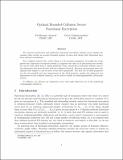| dc.contributor.author | Ananth, Prabhanjan | |
| dc.contributor.author | Vaikuntanathan, Vinod | |
| dc.date.accessioned | 2021-03-03T15:33:57Z | |
| dc.date.available | 2021-03-03T15:33:57Z | |
| dc.date.issued | 2019-11 | |
| dc.identifier.isbn | 9783030360290 | |
| dc.identifier.isbn | 9783030360306 | |
| dc.identifier.issn | 0302-9743 | |
| dc.identifier.issn | 1611-3349 | |
| dc.identifier.uri | https://hdl.handle.net/1721.1/130062 | |
| dc.description.abstract | We construct private-key and public-key functional encryption schemes in the bounded-key setting; that is, secure against adversaries that obtain an a-priori bounded number of functional keys (also known as the collusion bound). An important metric considered in the literature on bounded-key functional encryption schemes is the dependence of the running time of the encryption algorithm on the collusion bound Q = Q(λ) (where λ is the security parameter). It is known that bounded-key functional encryption schemes with encryption complexity growing with ε > 0, for any constant Q1-λ, implies indistinguishability obfuscation. On the other hand, in the public-key setting, it was previously unknown whether we could achieve encryption complexity growing linear with Q, also known as optimal bounded-key FE, based on well-studied assumptions. In this work, we give the first construction of an optimal bounded-key public-key functional encryption scheme under the minimal assumption of the existence of any public-key encryption scheme. Moreover, our scheme supports the class of all polynomial-size circuits. Our techniques also extend to the private-key setting. We achieve a construction of an optimal bounded-key functional encryption in the private-key setting based on the minimal assumption of one-way functions, instead of learning with errors as achieved in prior works. | en_US |
| dc.language.iso | en | |
| dc.publisher | Springer International Publishing | en_US |
| dc.relation.isversionof | http://dx.doi.org/10.1007/978-3-030-36030-6_8 | en_US |
| dc.rights | Creative Commons Attribution-Noncommercial-Share Alike | en_US |
| dc.rights.uri | http://creativecommons.org/licenses/by-nc-sa/4.0/ | en_US |
| dc.source | Prof. Vinod Vaikuntanathan via Phoebe Ayers | en_US |
| dc.title | Optimal Bounded-Collusion Secure Functional Encryption | en_US |
| dc.type | Book | en_US |
| dc.identifier.citation | Ananth, Prabhanjan and Vinod Vaikuntanathan. "Optimal Bounded-Collusion Secure Functional Encryption."
TCC: Theory of Cryptography Conference, Lecture Notes in Computer Science, 11891, Springer International Publishing, 2019, 174-198. © 2019 International Association for Cryptologic Research. | en_US |
| dc.contributor.department | Massachusetts Institute of Technology. Computer Science and Artificial Intelligence Laboratory | en_US |
| dc.relation.journal | Lecture Notes in Computer Science | en_US |
| dc.eprint.version | Author's final manuscript | en_US |
| dc.type.uri | http://purl.org/eprint/type/ConferencePaper | en_US |
| eprint.status | http://purl.org/eprint/status/NonPeerReviewed | en_US |
| dc.date.updated | 2021-02-25T13:43:17Z | |
| dspace.orderedauthors | Ananth, P; Vaikuntanathan, V | en_US |
| dspace.date.submission | 2021-02-25T13:44:21Z | |
| mit.journal.volume | 11891 | en_US |
| mit.license | OPEN_ACCESS_POLICY | |
| mit.metadata.status | Complete | |
